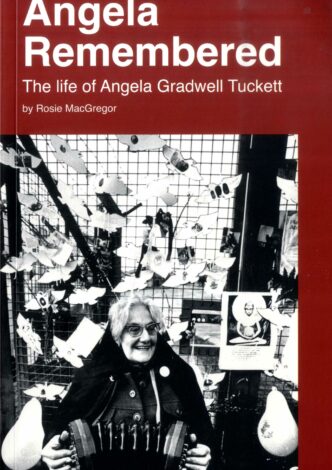Rosie MacGregor remembers Angela, that is Angela Gradwell Tuckett (1906-1994); a stalwart Communist, an all-round radical and something of a Renaissance woman. I’ll call her simply Angela too.
Angela had a radical family background. She descended on her father’s side from a family of abolitionist (and quite prosperous!) Quakers. Her maternal family line included her grandfather, Bristol artist Henry Stacy and her aunt the pioneering socialist Enid Stacy. Born in Weston-Super-Mare, Stacy was an accomplished public speaker who toured with the Clarion vans and wrote for The Clarion, supported women’s suffrage and as a strike organiser, participated in the ferment of the Bristol labour revolt during the 1890s. The Stacy family circle included among its friends Edward Carpenter, George Bernard Shaw and William Morris.
In this way Angela is a fascinating link, providing a bridge between the Victorian and Edwardian socialist movement and the radicals of the late Twentieth Century. She knew such early luminaries of the Labour Party as Hugh Gaitskell, Robert Crossman and John Strachey and lived to the time of the Major government. Who could have been better placed to write a biography of Enid Stacy, than Angela? Well, she did prepare such a book, namely They Called her ‘our Enid’: Life Story of Enid Stacy, Socialist, Feminist and Worker for Democratic Rights 1868-1903, the incomplete manuscript of which is currently being edited.
It is not only as the niece of Enid Stacy that Angela deserves recognition, however, and Rosie MacGregor’s short biography provides the details of a life lived to the full, mostly in Bristol and Swindon. She was Bristol’s first woman solicitor. She played hockey for England during the 1930s (although the selectors dropped her from the national team due to her undiplomatic refusal to condone the Nazi regime!). She wrote material for the Unity Players People’s Theatre which she helped her sister Joan to produce and was a musician who sang and performed with a concertina on the folk circuit until the end of her life. She even won a newspaper competition to take flying lessons, quickly gaining a pilot’s licence.
Angela’s legal background made her particularly useful to the labour movement. She was a legal observer for the National Unemployed Workers’ Movement marchers when they demonstrated in Bristol in 1932. She was therefore present during the clashes between police and marchers in Old Market in that year. She faced two baton charges and afterwards defended NUWM members in the courts. Her experience of taking on tough legal cases made her ideally qualified to head up the Legal Department of the National Council for Civil Liberties, which she did with great energy during the War years.
Angela’s Communist political sympathies led her to take a prominent role in anti-fascist activity in Bristol as Metaxas seized power in Greece and war broke out in Spain (she visited both countries during the 1930s). She was a founder member of Bristol’s Committee for the Defence of Spanish Democracy, set up to support the Spanish Republic during the Spanish Civil War and Revolution. The group argued forcefully that ‘Bombs on Barcelona mean Bombs on Bristol’ (which was exactly what happened just four short years later). Angela also wrote as a journalist for The Daily Worker during and after the Second World War and penned several pamphlets. She stood as a candidate for the Communist Party in the Wiltshire Council elections of 1967, though predictably to no avail (unlike fellow Communists Idris and Phyllis Rose, who both successfully gained seats in the local elections in nearby Trowbridge, in 1969).
To add colour Rosie MacGregor has unearthed some real treasures to accompany the text such as images of the Bristol Gasworkers’ Union banner, painted by Henry Stacy for his daughter Enid and Harry Pollitt’s signed tribute to Swindon (Cinderford shared the accolade).
During the upheavals of the 1930s, support for the Communist Party was a logical choice for radical activists disaffected with the shortcomings of the Labour Party; by the mid-1990s it was obviously a much more minority position. Unfortunately, while we have a clear idea of the public Angela – gloriously eccentric, committed, ‘formidable’ and sometimes ‘difficult’ it seems – we cannot track her inner political thoughts, unless there are further clues awaiting in the incomplete notes for an autobiography or among the apparently voluminous archive of Angela’s papers at the Working Class History Library in Salford. It would be intriguing to find out further how Angela responded to the mixed fortunes of, and controversies relating to, the Communist Party during these years. What were her private thoughts when The Daily Worker ceased hostility towards Nazi Germany due to the Molotov-Ribbentrop Pact? Was she a loyal party member to the end or did she have doubts? Did she have concerns about the role of the communist PSUC in Catalonia during the Spanish Revolution? Or about the legacy of Stalinism, or the military repression of workers in East Germany in 1953, Hungary in 1956 or Prague in 1968?
Rosie MacGregor’s speculation about Angela as an ‘idealist with a passionate, if somewhat romantic belief in a utopian future’ at the conclusion may well be accurate. Nevertheless, despite these known unknowns we do know she was a significant West Country radical who made a contribution on the right side of many of the great causes of her time and ours, not only at the regional level but also nationally and internationally. Now that Angela Gradwell Tuckett’s books are out of print and there is little else published about her, this book helpfully fills a gap and is worth seeking out for anyone interested in the history of the left, the labour movement and women’s history in the West County.
Steve Hunt
